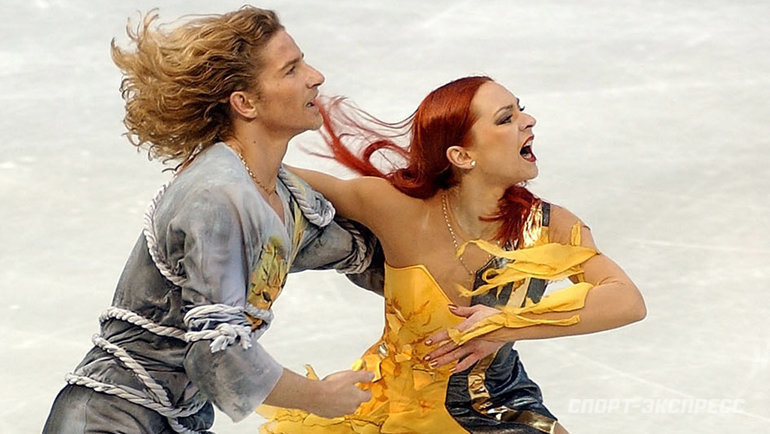Frau Muller
From Puerto Rico…With Love! Not LatinX!
- Messages
- 23,394
Applause to Robin Szolkowy, to have made it as far as he did, without complaints.
Follow along with the video below to see how to install our site as a web app on your home screen.
Note: This feature may not be available in some browsers.
Applause to Robin Szolkowy, to have made it as far as he did, without complaints.
Abuse is not linear. Abuse does not occur in all relationships the abuser has. Robin could have escaped without abuse and have good non abusive relationship while the next partner bears the brunt.Applause to Robin Szolkowy, to have made it as far as he did, without complaints.

Alena Savchenko called Bruno Massot lazy, but Marina did not consider her partner a person who does not like to work. She noted that he just had a different opinion about their sport. "Was Peizerat not trained to work? He's hardworking, but the environment was relaxing. School, girlfriends, entertainment. Figure skating was perceived as a circle "Skillful Hands". And I explained in broken English: this is not a hobby – a job!" added Anissina.
Q: Bruno, what was it like, training with Aljona?
Bruno: Terrible! She was a tyrant! She called me lazy! I have PTSD! In retrospect, it was too hard, and this medal is not as important to me now as I thought it would be.
FSU: Aljona is an abuser. She's just like Nassar!

Some signs of emotional abuse are obvious, like yelling or name-calling. Other signs are more subtle, such as the other person not wanting you to hang out with friends, or acting extremely jealous. Here are some red flags that signal another person is emotionally abusing you:
- Name-calling, demeaning, humiliating, shaming, and criticizing you in private or public
- Controlling and being possessive of you, your time, and actions, including what you wear, your job, and whom you hang out with
- Making you feel silly and dumb and dismissing how you really feel
- Questioning what you say and things that you say happened to you (called gaslighting)
- Acting extremely jealous of the time you spend with friends and family
- Punishing you by withholding attention or affection
- Threatening you and people you love, or threatening to hurt themselves to get what they want
- Wanting you to ask their permission before doing anything or going anywhere
- Monitoring where you go and what you're doing at all times
- Constantly accusing or blaming you for their abusive behavior and making you feel guilty
- Overloading you with compliments or gifts in order to manipulate you later
Didn't their relationship improve after their career ended?"Inspired" by the recent Massot article, Russia's Sport-Express has an article on the volatile relationship between Olympic Gold Medalists Marina Anissina and Gwendal Peizerat. The theme is on the complex relationship between partners in figure skating, and how typical it was for them to clash during training days that could extend to up to nine hours. One story is how Marina once threw her skates in frustration, breaking several bolts in her blades. However, at least in Anissina and Peizerat's case, the article concluded that many of these skating partner conflicts are exaggerated and simply the result of the high emotions that lead to great success.

«Бросил коньки в бортик, собрал вещи и ушел». Как Марина Анисина взбесила своего французского партнера
Гвендаль Пейзера жестко конфликтовал со звездной фигуристкой из России, но это не помешало паре завоевать олимпийское золото.www.sport-express.ru
However, at least in Anissina and Peizerat's case, the article concluded that many of these skating partner conflicts are exaggerated and simply the result of the high emotions that lead to great success.
I think it was Gwendal who kicked the board with one of his skates and the bolts and the blade came loose. Not that it matters much! Some days watching them practicing was quite the experience! She could scream at the top of her lungs, he would simply ignore her, and 5 mn later it was all over and they were laughing together. And I DO NOT imply there was never any abuse between them. Or that there was. As Marina was screaming in Russian, that I don't speak, she could as well have screamed at herself.One story is how Marina once threw her skates in frustration, breaking several bolts in her blades.
Her coaches and I believe partner did not know about the abortion. She was upset, depressed & was told to get it fixed(ie get help (like a therapist) and then return. They wanted her to take the time to heal. It was after that the news of the abortion was told.That's inaccurate - the abortion was her own decision. What she said is that she was suffering from depression (probably worsened after abortion) and she felt there was a lack of understanding.
While I absolutely don't think this was handled adequately by her coaches and partner, this is not the same as "they forced her to get an abortion".
I'm not concerned with rectifying a global wrong, only with actionable help. If someone wants to call you a lazy piece of shit every day, there isn't a damn thing you can do to make them stop. You can leave.And excuse the abuser for their behaviour. Yep we get it. Because in your mind it is that simple.
And for the people saying that she didn't have to be "nice" to him, why wouldn't you be nice to your skating partner? You spend 8-10 hours a day with them. You spend more time with them than your spouse or SO. You travel together, and often stay at the same hotel. Isn't it much easier if you have a good working relationship? (This does not mean every day is a good day, just the overall vibe.)
I don't think anyone claimed abuse in that relationship - did they? I think Marina's point is that they had times when passions ran high and people screamed and threw things.If that's the conclusion then the article is wrong. It's absurd to say that conflicts are "exaggerated" unless you were there every single day and saw every single interaction between the couple. Also, "high emotions" - and abuse - can and do occur in skating relationships where the couple ends up not being successful.
I'm not saying that A/P were in an abusive relationship. I'm saying that pointing at them and going "well, they argued and threw things but they were successful" and then implying that means everyone else who claims abuse is exaggerating - that's just ridiculous.
Not to mention that it might be a good idea to be nice to someone who is going to lift and throw you while skating over ice on a regular basis.And for the people saying that she didn't have to be "nice" to him, why wouldn't you be nice to your skating partner? You spend 8-10 hours a day with them. You spend more time with them than your spouse or SO. You travel together, and often stay at the same hotel. Isn't it much easier if you have a good working relationship? (This does not mean every day is a good day, just the overall vibe.)
I don't think anyone claimed abuse in that relationship - did they? I think Marina's point is that they had times when passions ran high and people screamed and threw things.
This is a rational, analytical approach to things. Human relationships aren't that simple. People that spend that much time together sometimes end up hating each other. In Aljona's case, I would like someone to provide an example of her being nice to anyone. I love her skating, but she isn't known for being "nice"... I remember being at a practice for an event, and thinking how Savchenko & Volosozhar (products of the same country, same training system, etc.) could not be more different. One kind and patient (took pictures with everyone who came up to her too!) and the other abrupt, angry and barking at the partner.And for the people saying that she didn't have to be "nice" to him, why wouldn't you be nice to your skating partner? You spend 8-10 hours a day with them. You spend more time with them than your spouse or SO. You travel together, and often stay at the same hotel. Isn't it much easier if you have a good working relationship? (This does not mean every day is a good day, just the overall vibe.)
My bad, I read the article too quickly and it was Gwendal, not Marina, who threw his skates in frustration in practice!I think it was Gwendal who kicked the board with one of his skates and the bolts and the blade came loose. Not that it matters much! Some days watching them practicing was quite the experience! She could scream at the top of her lungs, he would simply ignore her, and 5 mn later it was all over and they were laughing together. And I DO NOT imply there was never any abuse between them. Or that there was. As Marina was screaming in Russian, that I don't speak, she could as well have screamed at herself.


 However, others in elite skating who knew Marina far better than me have told me nice things about her.
However, others in elite skating who knew Marina far better than me have told me nice things about her.While I don't agree that Bruno could have left at any point (yes, he was a free man but as has been said, it's never that simple), this is not a comparable situation because whether she wanted to or not, Berezhnaya was not a free woman in the former Soviet Union. It would not have been up to her.Serious question. So what if the pairs skater is a female? Tiny and petite, the way Elena Berezhnaya was. She was locked in her room by her partner, beaten, and far away from her home base in Latvia.
I know a lot of people watched it but it is worth reminding about this again.While I don't agree that Bruno could have left at any point (yes, he was a free man but as has been said, it's never that simple), this is not a comparable situation because whether she wanted to or not, Berezhnaya was not a free woman in the former Soviet Union. It would not have been up to her.
I think that is part of the problem, too. There are a lot of skaters and coaches from the former Soviet Union and most of them don't have what I would call a healthy training mentality.

The incident in question happened in 1996, by which time Berezhnaya was a free woman in an independent Latvia, which had gained its independence in 1989. The Soviet Union didn't even exist in 1996. It had dissolved in 1991.While I don't agree that Bruno could have left at any point (yes, he was a free man but as has been said, it's never that simple), this is not a comparable situation because whether she wanted to or not, Berezhnaya was not a free woman in the former Soviet Union.
I remember that, I thought he was a horrid bullyAnyone else remember the Torvill & Dean documentary leading up to the 94 Olympics where there was an issue. It made Chris out to be a bully because Jayne was in tears. It ended up being a terrible piece of PR for them. If you read their autobiography they discussed it. But overall it is probably one of the most successful sporting partnerships in history. They are still going strong.
 (I was 13 and haven’t seen it since so I have no opinion on it now). I also remember being really pleased I liked G/P’s FD more because of it…
(I was 13 and haven’t seen it since so I have no opinion on it now). I also remember being really pleased I liked G/P’s FD more because of it…I guess I made Berezhnaya older than she is.The incident in question happened in 1996, by which time Berezhnaya was a free woman in an independent Latvia, which had gained its independence in 1989. The Soviet Union didn't even exist in 1996. It had dissolved in 1991.

Applause to Robin Szolkowy, to have made it as far as he did, without complaints.
You do know what PTSD is right? It's not something to make light of, and, in fact, it highlights the level of abuse he's talking about having had experienced by Aliona's actions towards him.Q: Bruno, what was it like, training with Aljona?
Bruno: Terrible! She was a tyrant! She called me lazy! I have PTSD! In retrospect, it was too hard, and this medal is not as important to me now as I thought it would be.
FSU: Aljona is an abuser. She's just like Nassar!
Posttraumatic stress disorder (PTSD) is a psychiatric disorder that may occur in people who have experienced or witnessed a traumatic event, series of events or set of circumstances. An individual may experience this as emotionally or physically harmful or life-threatening and may affect mental, physical, social, and/or spiritual well-being. Examples include natural disasters, serious accidents, terrorist acts, war/combat, rape/sexual assault, historical trauma, intimate partner violence and bullying,
PTSD has been known by many names in the past, such as “shell shock” during the years of World War I and “combat fatigue” after World War II, but PTSD does not just happen to combat veterans. PTSD can occur in all people, of any ethnicity, nationality or culture, and at any age. PTSD affects approximately 3.5 percent of U.S. adults every year. The lifetime prevalence of PTSD in adolescents ages 13 -18 is 8%. An estimate one in 11 people will be diagnosed with PTSD in their lifetime. Women are twice as likely as men to have PTSD. Three ethnic groups – U.S. Latinos, African Americans, and Native Americans/Alaska Natives – are disproportionately affected and have higher rates of PTSD than non-Latino whites.
People with PTSD have intense, disturbing thoughts and feelings related to their experience that last long after the traumatic event has ended. They may relive the event through flashbacks or nightmares; they may feel sadness, fear or anger; and they may feel detached or estranged from other people. People with PTSD may avoid situations or people that remind them of the traumatic event, and they may have strong negative reactions to something as ordinary as a loud noise or an accidental touch.

Symptoms of PTSD fall into the following four categories. Specific symptoms can vary in severity.
Many people who are exposed to a traumatic event experience symptoms similar to those described above in the days following the event. For a person to be diagnosed with PTSD, however, symptoms must last for more than a month and must cause significant distress or problems in the individual's daily functioning. Many individuals develop symptoms within three months of the trauma, but symptoms may appear later and often persist for months and sometimes years. PTSD often occurs with other related conditions, such as depression, substance use, memory problems and other physical and mental health problems.
- Intrusion: Intrusive thoughts such as repeated, involuntary memories; distressing dreams; or flashbacks of the traumatic event. Flashbacks may be so vivid that people feel they are reliving the traumatic experience or seeing it before their eyes.
- Avoidance: Avoiding reminders of the traumatic event may include avoiding people, places, activities, objects and situations that may trigger distressing memories. People may try to avoid remembering or thinking about the traumatic event. They may resist talking about what happened or how they feel about it.
- Alterations in cognition and mood: Inability to remember important aspects of the traumatic event, negative thoughts and feelings leading to ongoing and distorted beliefs about oneself or others (e.g., “I am bad,” “No one can be trusted”); distorted thoughts about the cause or consequences of the event leading to wrongly blaming self or other; ongoing fear, horror, anger, guilt or shame; much less interest in activities previously enjoyed; feeling detached or estranged from others; or being unable to experience positive emotions (a void of happiness or satisfaction).
- Alterations in arousal and reactivity: Arousal and reactive symptoms may include being irritable and having angry outbursts; behaving recklessly or in a self-destructive way; being overly watchful of one's surroundings in a suspecting way; being easily startled; or having problems concentrating or sleeping.

And was Bruno's PTSD clinically diagnosed?You do know what PTSD is right? It's not something to make light of, and, in fact, it highlights the level of abuse he's talking about having had experienced by Aliona's actions towards him.

What is Posttraumatic Stress Disorder (PTSD)?
Posttraumatic stress disorder (PTSD) is a psychiatric disorder that may occur in people who have experienced or witnessed a traumatic event such as a natural disaster, a serious accident, a terrorist act, war/combat, or rape or who have been threatened with death, sexual violence or serious injury.www.psychiatry.org
